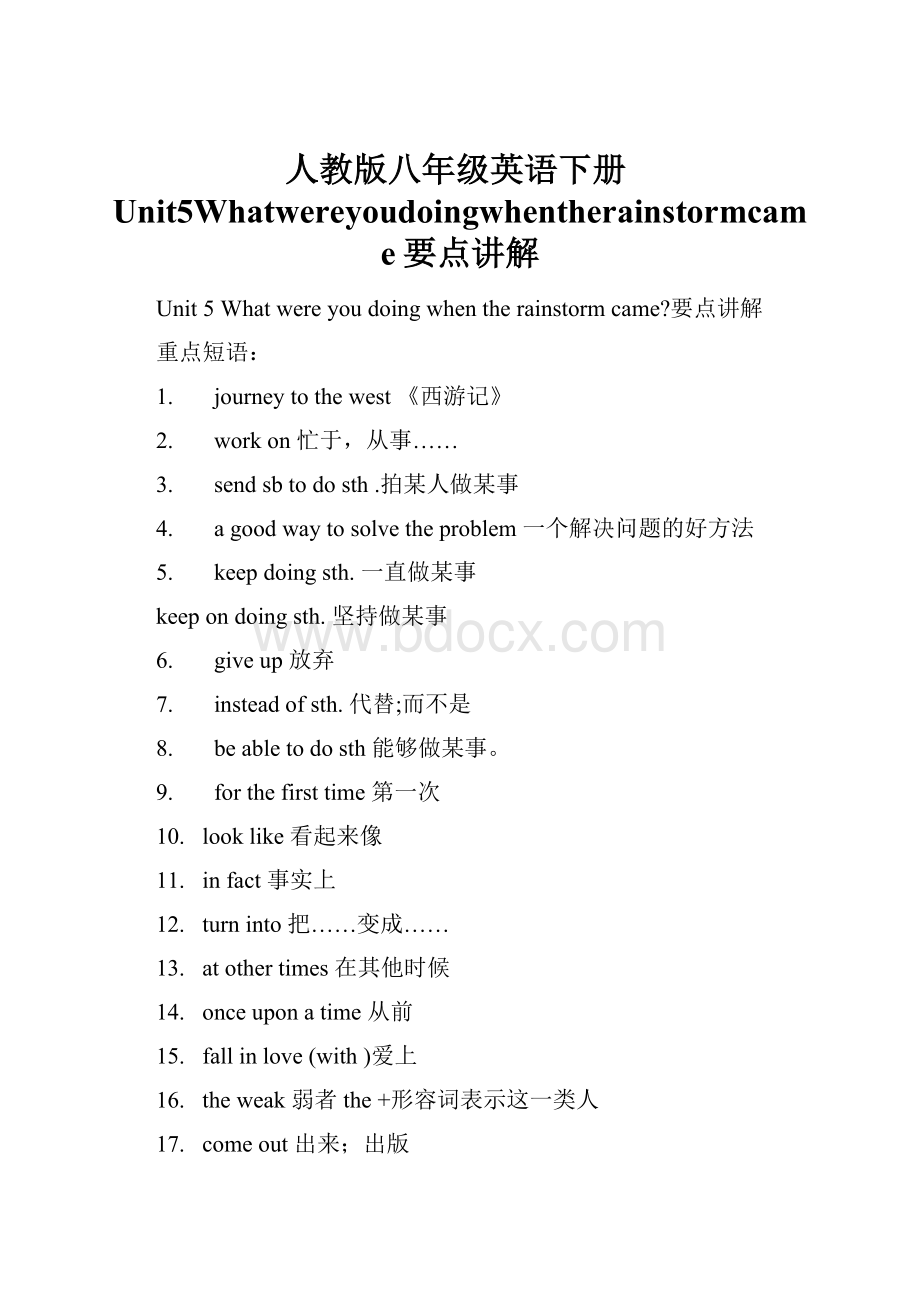人教版八年级英语下册Unit5Whatwereyoudoingwhentherainstormcame要点讲解.docx
《人教版八年级英语下册Unit5Whatwereyoudoingwhentherainstormcame要点讲解.docx》由会员分享,可在线阅读,更多相关《人教版八年级英语下册Unit5Whatwereyoudoingwhentherainstormcame要点讲解.docx(16页珍藏版)》请在冰豆网上搜索。

人教版八年级英语下册Unit5Whatwereyoudoingwhentherainstormcame要点讲解
Unit5Whatwereyoudoingwhentherainstormcame?
要点讲解
重点短语:
1. journeytothewest 《西游记》
2. workon 忙于,从事……
3. sendsbtodosth.拍某人做某事
4. agoodwaytosolvetheproblem 一个解决问题的好方法
5. keepdoingsth. 一直做某事
keepondoingsth. 坚持做某事
6. giveup 放弃
7. insteadofsth. 代替;而不是
8. beabletodosth 能够做某事。
9. forthefirsttime 第一次
10. looklike 看起来像
11. infact 事实上
12. turninto 把……变成……
13. atothertimes 在其他时候
14. onceuponatime 从前
15. fallinlove(with)爱上
16. theweak 弱者 the+形容词表示这一类人
17. comeout 出来;出版
18. acoupleof 三两个
19. getmarried 结婚
20. makehimselfahuman 使他自己成为人
21. makeaplan 制定计划
22. allovertheworld 全世界
23. inthemoonlight 在月光之中
24. belost/getlost 迷失
25. makeup 醒来,叫醒
26. findone’swayout 找到出路
27. lead(sb)to 把某人引向……
28. bemadeof 由……组成(能看出原材料的)
bemadefrom 由……组成(不能看出原材料的)
29. frominside 从……里面
30. learnabout 了解
31. puton 穿上
putoff 推迟,扔掉,阻止
区别:
puton 穿上
dress 穿
wear 穿
haveon 穿
bein 穿着
unit5whatwereyoudoingwhentherainstormcame?
重点语法知识点:
1. be+doing 进行时的标志
区别:
现在进行时
过去进行时
结
构
am
is + doing(现在分词)
are
结
构
was
+doing(现在分词)
were
用法
特点
用法
特点
表示说话正在进行的动作
有时间状语,如now 或者一些动词如look!
Listen!
表示过去某一时刻正在进行的动作
有过去某时刻的时间状语,或者时间状语从句
表示将来时
表示位移的某些词如:
go,come,leave
表示过去将来时
表示位移的某些词如:
go,come,leave
表示目前现阶段的动作(但说话时不一定在进行)
有时间状语,例如thesedays,thisterm.等
表示在过去某个过程中翻身的动作,这个过程往往用过去进行时,而发生的动作则用一般过去时
句中有并列连词while或when=justatthattime和一些常见的时间状语:
atninelastnight
2. Whatwerepeopledoing yesterdayatthetimeoftherainstorm?
过去进行时的特殊疑问句与现在进行时的特殊疑问句 用法一样
特殊疑问词+ 一般疑问句 + ?
过去进行时的一般疑问句:
将was/were 提前,当遇到第一人称的时候,将第一人称转变成第二人称
过去进行时的否定句在was/were后面加not 缩写成:
wasn’t/weren’t。
Eg:
Mysisterwas doingmyhomework atthetimeoftherainstorm.
一般疑问句:
Wasyoursisterdoingyourhomeworkatthetimeofrainstorm?
否定句:
Mysisterwasn’t doingmyhomeworkatthetimeoftherainstorm.
特殊疑问句:
what wasyoursister doing atthetimeofrainstorm?
3. Myalarmdidn’t gooff soI___uplate.
关于go的一些短语:
gooff 发出响声 goover 复习
goaway 离开 goby (时间)过去
goahead 进行,前进,继续 goafter 追逐,追赶
4. I____forthebuswhenitbegantorain heavily.
heavily 副词 有沉重的;猛烈的。
在本句中表示一中程度,表示雨很大。
heavy
adj. 沉重的
Howheavyareyou?
heavily
adv 沉重地
Thearmylostheavily.
类似的词有:
hungry
饥饿的
hungrily
happy
快乐的
happily
angry
生气的
angrily
lucky
幸运的
luckily
5. I___tothebusstopbutIstillmissedthebus.
miss错过 (后接名词、代词或动词ing)
想念;思念 Imissyou.
6. Icalledatsevenandyoudidn’t pickup.
pickup
接电话
Tom,Icalledyou,butyoudidn’tpickup
捡起;拾起
Ipickupawalletonmywayhome
(开车)接某人
Iwillpickyouupatthestation
学到;获得
Hewaspickinguptheskillsquickly.
7. Withnolight outside,it feltlike midnight.
with+n+adv ,在句中做伴随状语
with+n+adj. Shecanseestarsinthedarkskywiththewindowopen
feellikedoingsth=wouldlike/wanttodosth想要做某事
8.ThenewsonTV reported thataheavyrainstormwasinthearea.
reportv 报道 →reportern 记者
makeareport 做报告 weatherreport 天气预报
giveareport 作报告 It’sreportedthat… 据报道
8. so,whentherainstormsuddenlycame,whatwereyoudoing?
关于so 的用法:
无实际意义,表示惊讶或领会,引出后面内容
So,youwerethefirstonetoentertheclassroom.
做语气词
so
so+adj./adv “如此……”
Thebookissointeresting.
作副词
so+adj./adv+that 从句
Heransofastthatnoonecouldcatchupwithhim.
作连词
so+ 从句 “所以“
Iwasillyesterday,soIdidn’tgotoschool.
sothat+从句 “以便,为了……”
IfixedtheTVsothatwecanwatchittonight
9. Isee.Icalledagainateightandyoudidn’tanswerthen either.我知道了
seesb.dosth 看到某人做某事(看到的是全过程)
seesb.doingsth 看见某人正在做某事
区别:
either/too/aswell/either
(1)also 也,用于肯定句句中,用在实义动词之前,系动词、助动词、情态动词之后。
(2)too 也,用于肯定句句末,需要加一个逗号。
(3)either 也 ,通常放于否定句末
(4)aswell 也,通常也放在句末,可以和too互换。
10. Ben’sdadwasputtingpiecesofwoodoverthewindows while hismomwas makingsure theflashlightsandradiowere working.
makesure确信; 确保
makesuretodosth. 确保做某事
makesureof 确定;确保;尽力做到
work运转;发挥作用。
E.g. Themedicinedoesn’twork. 这要不起作用
work有三个意思:
⑴ 表示“工作”,是不可数名词:
Hehastoomuchworktodo. 他要做的工作太多。
⑵ 表示“著作”或“作品”,是可数名词,但多用复数:
HehasreadmanyofHemingway’sworks.
⑶ 表示“工厂”,只用复数形式,但可表示单数意义:
Theglassworks(=factory)isnearthestation. 玻璃工厂在车站附近。
10. Benwashelpinghismommakedinnerwhentherainbeganto beat heavily against thewindows.
beat和win区别:
e.g. Webeatthembythescoreof2to1. 我们以2:
1赢了他们。
Whichteamwonthefootballmatch?
哪个对赢了那场足球赛?
heavily(见4)
against 倚;碰;撞
⑴ 表示“反对”,其反义词为 for。
若表示“强烈反对”,一般用副词 strongly.
Are you for or against the plan?
你对这个计划是赞成还是反对呢?
⑵ 表示位置,意为“靠着”、“顶着”、等:
The teacher’s desk is against the wall. 老师的办公桌靠墙放着。
11. Bencouldnotsleep atfirst.
(1)atfirst=atthebeginning 最初,开始 (强调在时间顺序或做某事过程等开始之初)
(2)firstofall 首先,第一 (表明陈述事情的重要性)
12.Hefinally fellasleep whenthewindwasdyingdownataround3:
00a.m.
fallasleep 进入梦乡;睡着
区别:
gotobed/sleep/asleep
(1)sleep=beinbedv 睡觉,指睡的动作状态
(2)gettosleep=fallasleep 入睡,强调进入睡眠的状态
(3)gotobed 上床睡觉,强调睡觉的动作
beasleep 强调睡着的状态
asleep
fallasleep 强调入睡的动作
区别diedown和dieout的:
指火的熄灭时,用diedown或dieout皆可。
diedown往往指火势由强到弱慢慢熄灭,植物慢慢死亡这一过程;
dieout则指熄灭这一事实,而且不及diedown用的普遍。
diedown:
反映风、声音、愤怒、掌声、战斗等平息下来。
dieout:
指家庭、种族、物种、组织、信仰等的消失或消亡。
12. Whenhe wokeup.thesunwas rising.
wakeup(v+adv) 醒来;睡醒
rise 增加;提高;增强;上升,升起
rise
升起;上升
主语自身移向较高位置
Pricerosegradually
raise
举起;提高
主语发出的动作作用于其他事物
Let’sraiseourglassestoTom.
13. Fallentrees,brokenwindowsandrubbishwere everywhere.
含义
用法
例句
everywhere
处处;到处;各个地方
可用于任何句式
Wehavemanyfriendseverywhereintheworld
somewhere
某个地方
多用于肯定句中
Youcangosomewhereyouliketo.
anywhere
任何地方
否定句
Youcan’tgoanywhere
疑问句
CanIgoanywhereIchoose
14. Theyjoinedtheneighborstohelpcleanuptheneighborhoodtogether. 他们加入到邻居们中,一起打扫社区。
join/joinin/takepartin
(1) join=beamemberof 参加 ,指加入某种组织,并成为其中的一员。
jointhearmy/party 入伍/ 党 jointheclub 加入俱乐部
joinin 后接活动名称
joinsb. 加入到某个人群之中
(2)takepartin 参加,指加入群体活动中并在活动中发挥重要作用。
( )–Isupposewe’llgotoplanttreesnextweek.
--Terrific!
Plantingtreesisalotoffun.I’dliketo___you.
A.visit B.join C.follow D.meet
( )–Mary,wouldyouliketo___thisgame?
—I’dloveto,butIhavetofinish___thecompositionfirst.
A.joinin;towrite B.attend;writing
C.join;towrite D.takepartin;writing.
( )He______anEnglishclublastyearandhasimprovedhisEnglishalot.
A.protected B.produced C.joined D.received
get/reach/arrive
getto+地点=arrivein/at+地点=reach+地点
geton 上车 getup 起床 getusedto 习惯于
getalongwithsb 与某人相处融洽 gettogether相聚
SectionB
1.Whateventhappenedattheschoolyesterday?
昨天学校发生了什么事?
happen 发生;碰巧(指偶然性发生)
(1)happen 动词“发生”没有被动语态,主语是物,强调某事发生的偶然性。
a.sth.happentosb. 某事发生在某人身上
Whathappenedtoyou?
=Whatwaswrongwithhim?
b.sb.happentodosth. 某人碰巧做某事
Shehappened________(be)outwhenwecalled.
(2)takeplace 发生,指事情有计划有安排地发生
Thesportsmeetingtookplaceinourschoollastweek.
(3)Ithappenedthat…碰巧
2.Kate realized herbagwasstillathome. 凯特意识到她的包还在家。
realize v 意识到
⑴ realize+n shedidn’trealizehermistake.
⑵ realize+从句 Ididn’trealizethatyouweresounhappy.
3.RobertAllenisnow over 50,buthewasaschoolpupilatthattime.罗柏特. 艾伦现在已经50多岁了,但那时候他还只是一名小学生。
( ) Mrs.Kingputacoat_____thesleepinggirltokeepherwarm.
A.over B.with C.behind D.beside
over越过,在……之上;with带有,伴随,用某种工具;behind在……后面;beside在……旁边。
句意:
为了让她保暖,金夫人在这个睡着的女孩身上盖了一件外套。
结合语境可知选A
4.Whentheschoolbasketballcompetitionstarted,Katewasstill makingherwaytoschool. 当学校篮球比赛开始的时候,凯特还在去学校的路上。
makeone’swayto… 在某人去……的路上(当后接地点副词时,应省略介词to)
( )I’llmakemyway___homenow.
A.to B./ C.at D.on
5.Ourteachersaid,“Dr.Kingdiedjust10minutesago.” 我们的老师说:
“金先生10分钟前去世了”。
一段时间+ago 之前,用于一般过去时
( ) —Whoisthelittlegirlinthepicture?
—It’sme.Thepicture ________10yearsago.
A.took B.istaken C.hastaken D. wastaken
( ) IknowalittleaboutThailand,asI _____therethreeyearsago.
A.havebeen B.havegone C.willgo D. went
6.Wewerecompletelysurprised!
我们完全震惊了!
completev 完成 adj. 完整的 →completely 彻底地;完全地
【2013新疆】Physicalexercisemakesyoutiredbut relaxed.
① I____________(complete)believeinyounow.Ithinkyouarehonestinthematter.
② They____________(complete)buildingthebridgelatenextyear.
7.Myparentsdidnottalkafterthat,andwe finished therestof ourdinnerinsilence. 之后我的父母没再讲话,我们在沉默中吃完了晚饭。
finish 完成
finishsth. 完成某事 e.g.I’llfinishmyhomeworkintime.
finishdoingsth.完成做某事 Imustfinishdoingmyhomeworkthisafternoon.
therestof…“其余的,剩下的”,做主语时,其谓语动词的数要与therestof 修饰的名词一致。
e.g.Therestofmeat goes bad.
Therestofworkers are stillworkinghard.
8.Schoolclosedfortheday,andRobertandhisfriendswalkedhome insilence. 学校停课一天,罗柏特和他的朋友们沉默地走回了家。
silence n 沉默 →silent 沉默;缄默;无声
insilence 沉默地、无声地 =silently
keepsilent 保持沉默
( )Whenheheardthebad